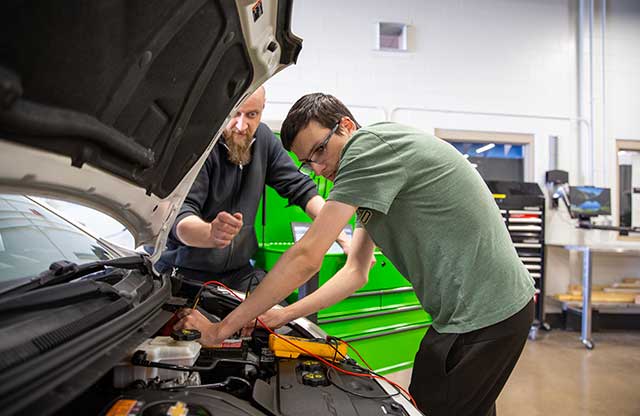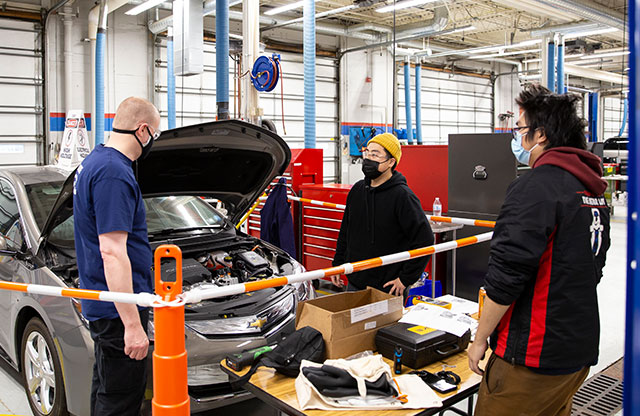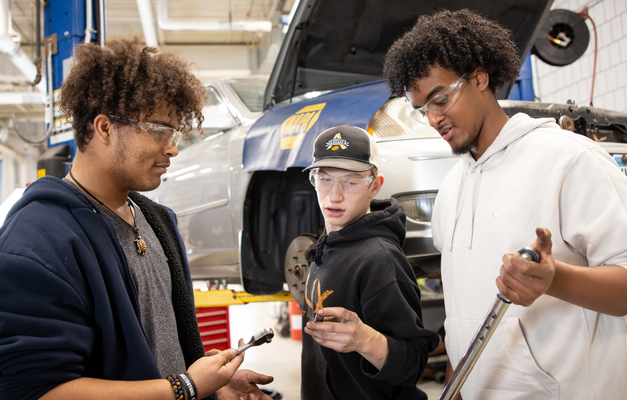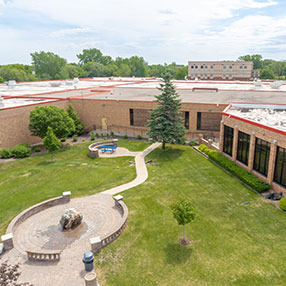Jump start your automotive career at one of the top Automotive Technician training programs in Minnesota. With more than 276,000,000 light-duty cars and trucks on the road in the United States alone, there will always be jobs for qualified technicians.
Anoka Technical College’s Automotive Technician program prepares graduates for work through extensive hands-on education on state-of-the-art equipment.
Why Study Automotive Tech at Anoka Tech?

Hands-on Education
75% of your time in the program is spent in the lab

Nationally Accredited by ASE

High-Demand Career
12,700+ new jobs needed to meet demand between 2020-2030
Industry & Career Outlook
Potential Jobs:
- Automotive Service Technician
- Mechanic
- Automotive Maintenance Technician
Salary Information:
Median Wage: $24.67 per hour
Top Earners: $38.69 per hour
Information provided is for Minnesota. See current data at mn.gov/deed.
Hear from Our Students
Other Program Info
The Anoka Technical College Automotive program is nationally accredited by the National Institute for Automotive Service Excellence (ASE) Education Foundation through 4/1/2025.
Anoka Tech's state-of-the art Automotive Lab is equipped with current equipment, technology and tools.
Take a virtual tour and review the lists below to get an idea of what it's like to be an Automotive Technician student at Anoka Tech.
Technology
Students have access to cutting-edge technology including:
- Analytical or scientific software: updateable software used in all of the scan tools and electronic four wheel alignment equipment
- Electronic vehicle service information retrieval: AllData; Mitchell OnDemand 5; General Motors Electronic Service Information (ESI)
- Vehicle service and repair estimating software: Mitchell OnDemand 5
Tools
- Electrical and electronic diagnostic equipment: Digital Multi-Meters (DMM’s); General Motors’ Tech 1 and Tech 2 scan tools; Ford’s Next Generation Scan tool (NGS); Chrysler’s DRB-III scan tool; SPX/OTC
- Genisys scan tools; digital storage and live oscilloscopes; battery “capacitance testers”; battery, starter, and charging system testers; chassis ear electronic listening device; wheel balancing and four wheel alignment equipment; air conditioning refrigerant recovery; recycling and recharging stations
- Pressure indicators: fuel pressure testers; air conditioning manifold pressure gauges;intake manifold vacuum gauges; oil pressure gauges; tire pressure gauges
- Bearing pullers and presses: ball joint separators; bearing pullers; gear puller tools; slide hammers
- Specialty wrenches: alignment wrenches; chain wrenches; locking wrenches; lug wrenches
- Trim or molding tools: carbon scrapers; gasket scrapers; scrapers
- Precision measuring tools: feeler gauges; inside and outside micrometers; vernier calipers; depth gauges; small bore gauges; cylinder taper gauges; torque wrenches
Automotive Students are required to provide their own professional quality set of hand tools and have them available for lab use each day that they are at school.
These tools will eventually be required on the job as an automotive technician.
Advanced Automotive Electronic Diagnostic Specialist
The Electronic Diagnostic Specialist program is intended to provide the successful Automotive Technician program graduate with additional knowledge and skills needed to accurately and cost effectively diagnose and repair the complex vehicle systems of today and tomorrow.
Info for Current Students
Why Study Automotive Tech at Anoka Tech?

Hands-on Education
75% of your time in the program is spent in the lab

Nationally Accredited by ASE

High-Demand Career
12,700+ new jobs needed to meet demand between 2020-2030
Industry & Career Outlook
Potential Jobs:
- Automotive Service Technician
- Mechanic
- Automotive Maintenance Technician
Salary Information:
Median Wage: $24.67 per hour
Top Earners: $38.69 per hour
Information provided is for Minnesota. See current data at mn.gov/deed.
Other Program Info
The Anoka Technical College Automotive program is nationally accredited by the National Institute for Automotive Service Excellence (ASE) Education Foundation through 4/1/2025.
Anoka Tech's state-of-the art Automotive Lab is equipped with current equipment, technology and tools.
Take a virtual tour and review the lists below to get an idea of what it's like to be an Automotive Technician student at Anoka Tech.
Tools
Check out the tools students learn to use:
Electrical and electronic diagnostic equipment: Digital Multi-Meters (DMM’s); General Motors’ Tech 1 and Tech 2 scan tools; Ford’s Next Generation Scan tool (NGS); Chrysler’s DRB-III scan tool; SPX/OTC
Genisys scan tools; digital storage and live oscilloscopes; battery “capacitance testers”; battery, starter, and charging system testers; chassis ear electronic listening device; wheel balancing and four wheel alignment equipment; air conditioning refrigerant recovery; recycling and recharging stations
Pressure indicators: fuel pressure testers; air conditioning manifold pressure gauges;intake manifold vacuum gauges; oil pressure gauges; tire pressure gauges
Bearing pullers and presses: ball joint separators; bearing pullers; gear puller tools; slide hammers
Specialty wrenches: alignment wrenches; chain wrenches; locking wrenches; lug wrenches
Trim or molding tools: carbon scrapers; gasket scrapers; scrapers
Precision measuring tools: feeler gauges; inside and outside micrometers; vernier calipers; depth gauges; small bore gauges; cylinder taper gauges; torque wrenches
Automotive Students are required to provide their own professional quality set of hand tools and have them available for lab use each day that they are at school.
These tools will eventually be required on the job as an automotive technician.
Info for Current Students
In the News

Anoka Tech offers new and updated programs starting fall 2023

New Automotive Electronic Diagnostic Specialist diploma program at Anoka Technical College
Start Dates:
Fall Semester: August



